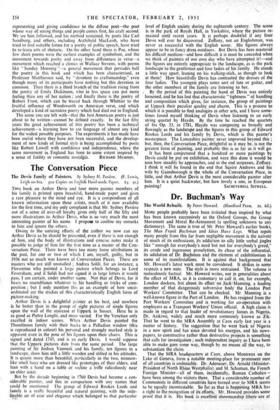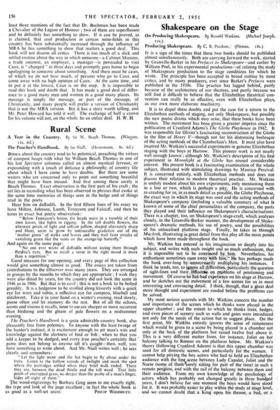Dr. Buchman's Way
The World Rebuilt. By Peter Howard. (Blandford Press. 23. 6d.) MoRE people probably have been irritated than inspired by what has been known successively as the Oxford Groups, the Group
Movement and Moral Re-Armament (a spelling unknown to any
dictionary). The same is true of Mr Peter Howard's earlier books, The Man Frank Buchman and Ideas Have Legs. What repels many people from this far from negligible movement is the naivete of much of its enthusiasm, its addiction to silly little verbal jingles like " enough for everybody's need but not for everybody's greed," its crude and ingenuous proselytism, its chase of the influential, its adulation of Dr. Bucihman and the element of exhibitionism in some of its manifestations. It is against that background that Mr. Howard's latest work must be considered. It strikes in some respects a new note. The style is more restrained. The volume is meticulously factual. Mr. -Howard writes, not in generalities about the effect of MRA, as it is customary to call it, on, for example, London dockers, but about its effect on Jack–Manning, a leading member of that dangerously subversive body the London Port Workers' Committee. That can be checked. Mr. Manning is a well-known figure in the Port of London. He has resigned from the Port Workers' Committee and is working for co-operation with employers as a Transport Workers' Union official. A high claim is made in regard to that leader of revolutionary forces in. Nigeria, Dr. Azikiwe, widely and much more commonly known as Zik. That he went to the MRA Assembly at Caux early last year is a matter of history. The suggestion that he went back to Nigeria in a new spirit and has since devoted his energies, and his news- papers, to constructive rather than destructive projects is something that calls for investigation ; such independent inquiry as I have been able to make goes some way, though by no means all the way, to substantiate the claim.
That the MRA headquarters at Caux, above Montreux on the Lake of Geneva, form a notable meeting-place for prominent men of all countries is undeniable. Dr. Adenauer. Dr. Arnold (Minister- Prasident of North Rhine Westphalia). and M. Schuman, the French Foreign Minister—all of them, incidentally, Roman Catholics— have been among the visitors there. That a considerable number of Communists in different countries have turned over.to MRA seems to be equally incontestable. So far as that is happening MRA has a right to the recognition of its efforts. Mr. Howard provides some proof that it is. His book is excellent showmanship (there are at
least three mentions of the fact that Dr. Buchman has been made a Chevalier of the Legion of Honour ; two of them are superfluous) and he definitely has something to show. If it can be proved, as is claimed, that coal production in certain mine-fields in this country has been substantially increased through the influence of MRA he has something to show that matters a good deal. This book will not disarm all critics. There is too much of a slick and settled routine about the way in which someone—a Cabinet Minister, a trade unionist, an employer, a manager—is persuaded to visit Caux, is "changed " in three days and promptly goes home to begin apologising to someone about something. And there must be cases, of which we do not hear much, of persons who go to Caux and come away with no high opinion of Caux. At the same time, and to put it at the lowest, Caux is on the map. It is impossible to read this book and doubt that. It has made a good deal of differ- ence to a good many men and women in a good many places. Its message is simply the message, or part of the message, of Christianity, and many people will prefer a version of Christianity that is not the MRA version. But it -has a story worth telling, and Mr. Peter Howard has told it well. The exchange of half a crown for his volume will not, on the whole, be an unfair deal. H. W. H.



































 Previous page
Previous page